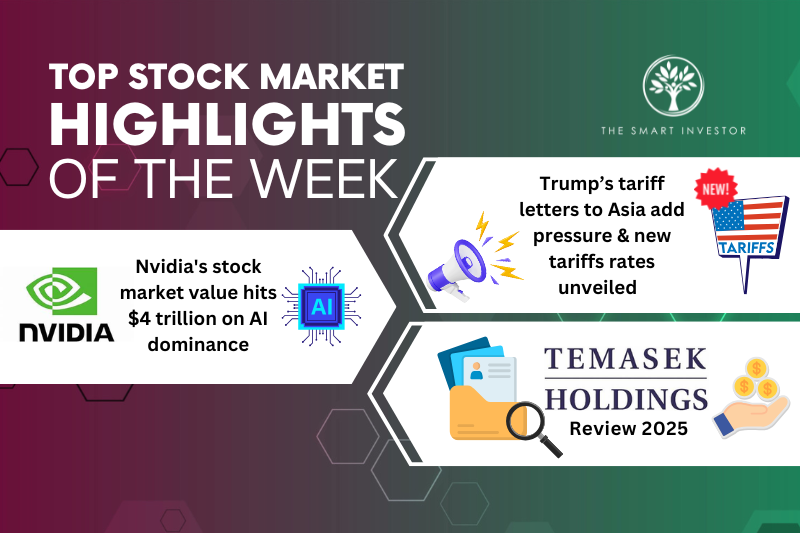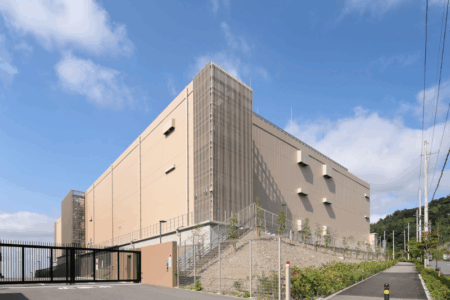Welcome to this week’s edition of top stock market highlights.
Trump’s tariffs
Trump is at it again with his tariff threats.
The US President previously initiated a 90-day pause on his raft of reciprocal tariffs as the US began negotiations with countries on trade agreements.
With this window expiring, Trump has fired his latest salvo by issuing letters to a host of Asian nations.
These letters laid out the consequences of not hammering out a trade deal by 1 August.
Both South Korea and Japan will suffer 25% tariffs by 1 August, while other countries such as Indonesia and Thailand saw higher tariffs of 32% and 36%, respectively.
Malaysia was not spared either, as it was slapped with a 25% tariff if it did not reach an agreement by the deadline.
The rates for Laos, Myanmar and Cambodia were 40%, 40%, and 36%, respectively.
Singapore, India, and Taiwan were spared and did not receive any letters from the White House on reciprocal tariffs; thus, they will have to pay the base rate of 10%.
Asia’s businesses are bracing for tougher times as supply chains are ready to cope with cost increases, and as governments in these countries scramble to seal a deal with Trump before the deadline.
These rates were just the beginning, though.
A new round of tariffs was announced soon after, with Brazil suffering the highest tariff rate of 50%.
Other countries such as Sri Lanka, Brunei, and the Philippines saw tariff rates of 30%, 25%, and 20%, respectively.
The case of Brazil is strange as it runs a trade deficit with the US and is one of the US’s 20 top trading partners.
Trump reiterated that these rates are based on “common sense”, deficits, raw numbers, and history.
According to the US President, he refused to budge on the 1 August deadline, saying that no extensions will be granted on country-specific tariffs.
However, even if the tariffs do take effect as planned, negotiations between the US and other countries can continue, implying that rates could eventually come down from these lofty levels.
Nvidia Corporation (NASDAQ: NVDA)
Nvidia became the first company in history to achieve a market capitalisation of US$4 trillion.
The chip designer and manufacturer of the graphics processing unit (GPU) saw its shares rise as much as 2.8% intraday to an all-time high of US$164.42.
It closed at US$162.88, just shy of the US$4 trillion mark.
Investors are betting on a continued surge in demand for artificial intelligence (AI) technologies that will power Nvidia’s top and bottom lines.
The company’s high-performance chips and GPUs form the backbone of this AI revolution and are purchased by many technology titans such as Microsoft (NASDAQ: MSFT) and Meta Platforms (NASDAQ: META).
Other clients include Alphabet’s (NASDAQ: GOOGL) Google and e-commerce behemoth Amazon (NASDAQ: AMZN).
Chinese technology giants Tencent (SGX: HTCD), Baidu (HKSE: 9888) and Alibaba (SGX: HBBD) also count themselves as big customers.
Of late, however, rivals such as Advanced Micro Devices (NASDAQ: AMD) are attempting to chip away at Nvidia’s dominance with new chips of their own.
For the first quarter of fiscal 2025 ending 27 April 2025, Nvidia reported a 69% year-on-year surge in revenue to US$44.1 billion.
Net profit came in at US$18.8 billion, up 26% year on year.
Temasek Holdings
Temasek Holdings has released its latest fiscal 2025 (FY2025) annual review for the year ended 31 March 2025.
The investment firm’s net portfolio value, which includes the market values of all listed and unlisted investments, rose 11.6% year on year to S$434 billion.
This increase came about because of a robust performance by its Singapore-based listed companies and direct investments in China, the US, and India.
Temasek owns stakes in DBS Group (SGX: D05), Singtel (SGX: Z74), Sembcorp Industries (SGX: U96) and Singapore Technologies Engineering (SGX: S63).
These names have done well in the past year and surged together with the Straits Times Index.
For FY2025, the 20-year shareholder return remained unchanged from 2024 at 7%.
The 10-year total shareholder return, however, dipped slightly from 6% to 5% over the same period.
The drop is because FY2015 was removed from the calculation, and that was a year of strong performance for Temasek’s portfolio.
For the fiscal year, the company made S$52 billion of investments and divested S$42 billion for a net investment of S$10 billion.
Temasek continues to invest in artificial intelligence and infrastructure, and this includes digital infrastructure as well.
The US remains a key investment destination, with Chief Investment Officer Rohit Sipahimalani stating that the firm is finding a lot of attractive opportunities there.
Attention Growth Investors: Our latest report, “The Rise of Titans,” gives you a front-row seat on the 7 most influential US stocks today. If you’re passionate about tech and growth, you can’t go wrong with our research. Downloading this FREE report could be the most strategic move you make this year. Click here to get started now.
Follow us on Facebook, Instagram and Telegram for the latest investing news and analyses!
Disclosure: Royston Yang owns shares of DBS Group, Alphabet and Meta Platforms.





